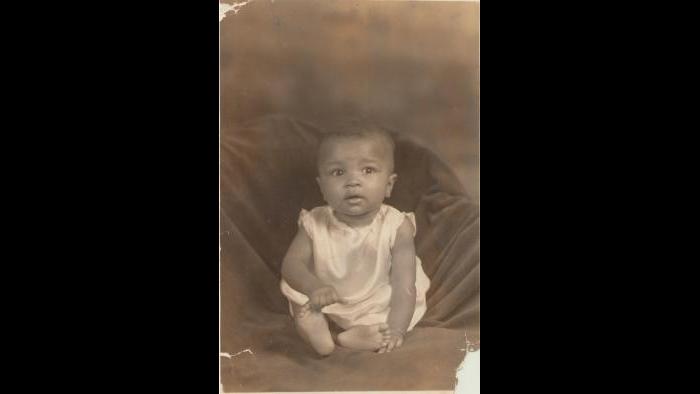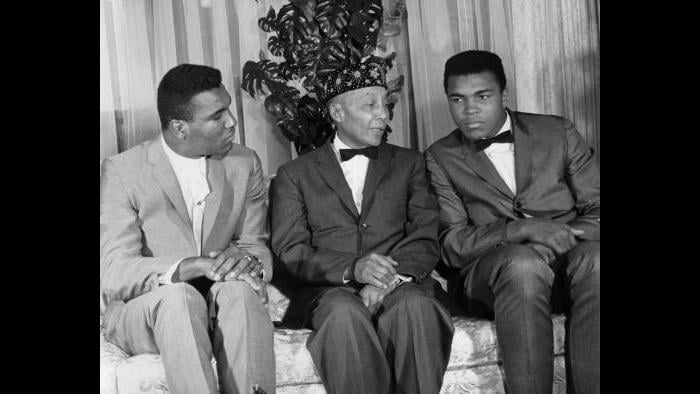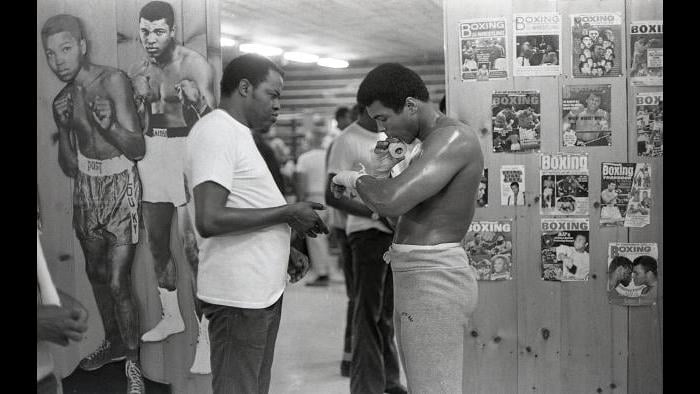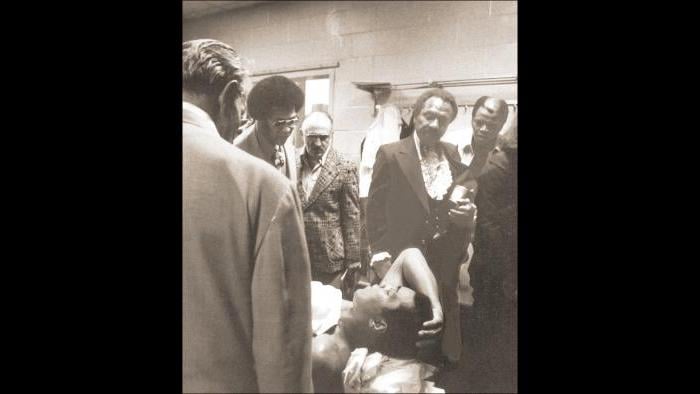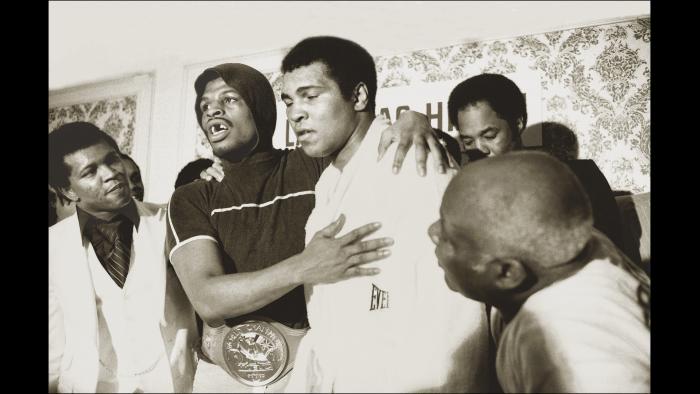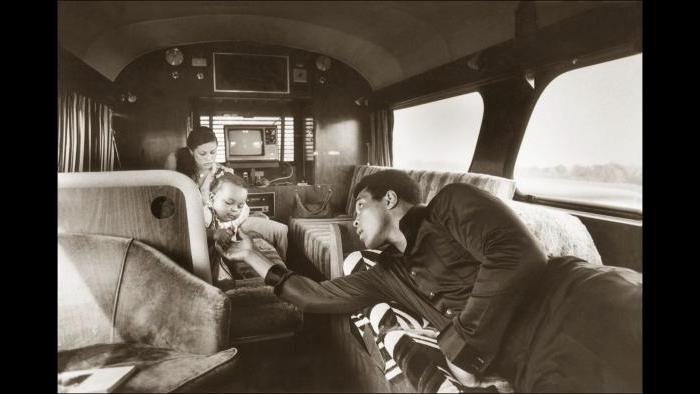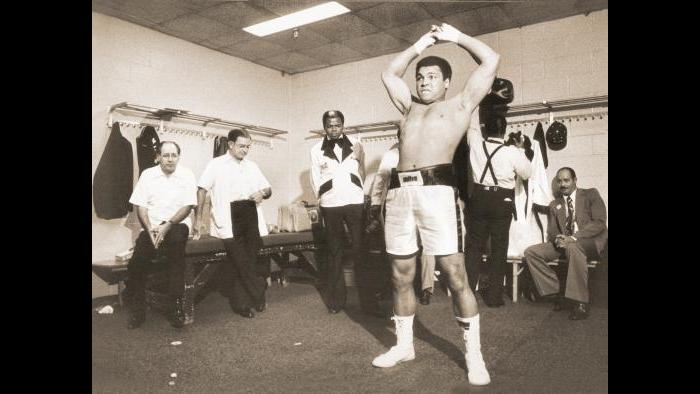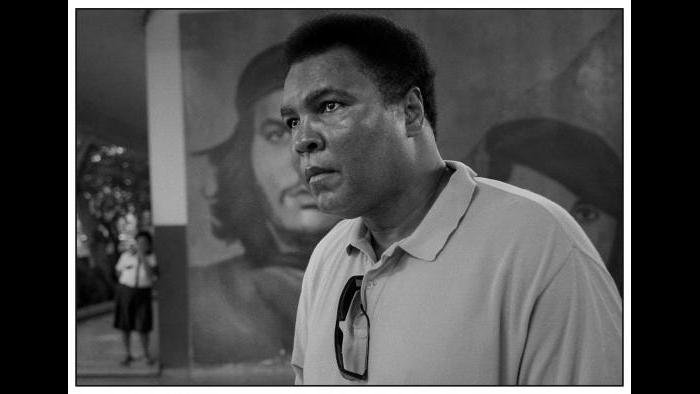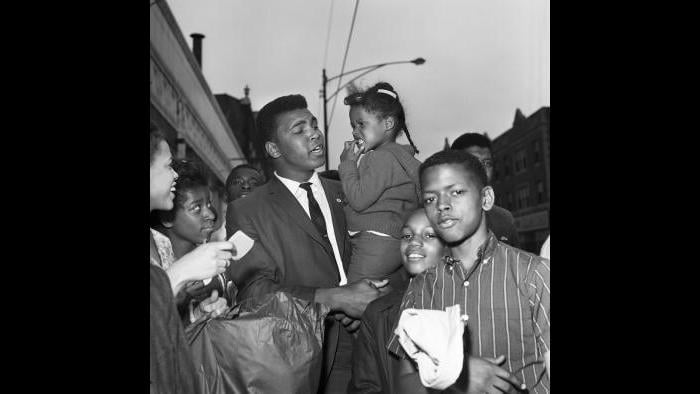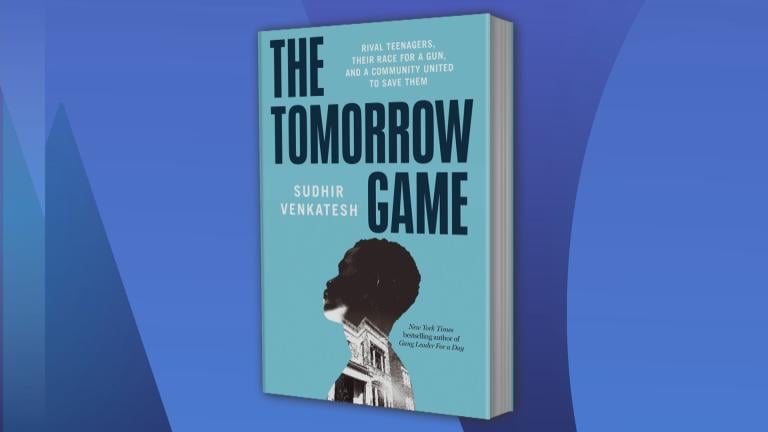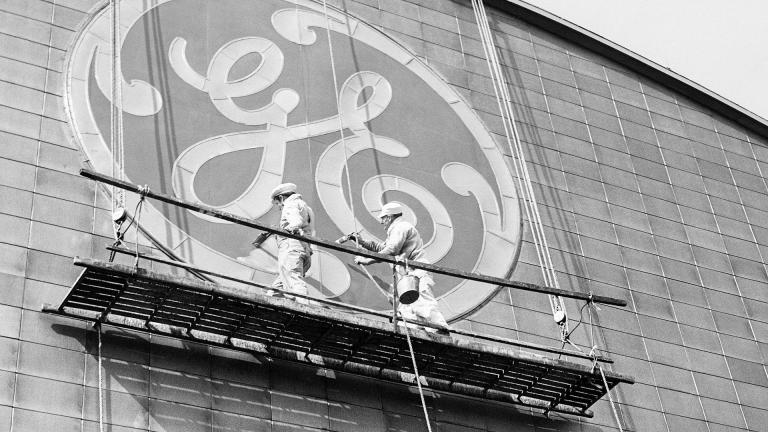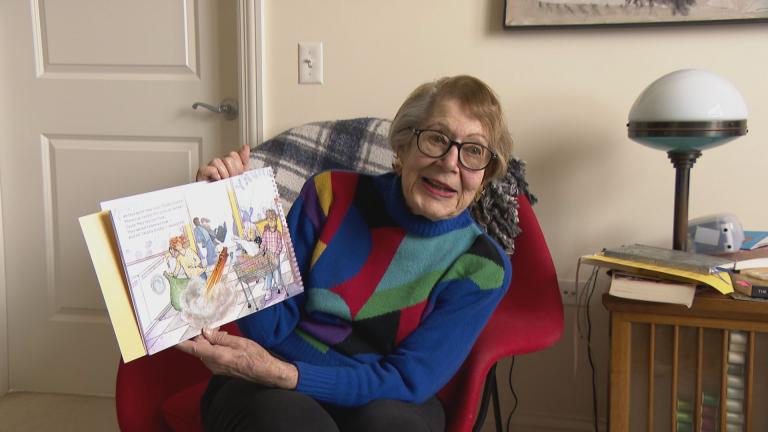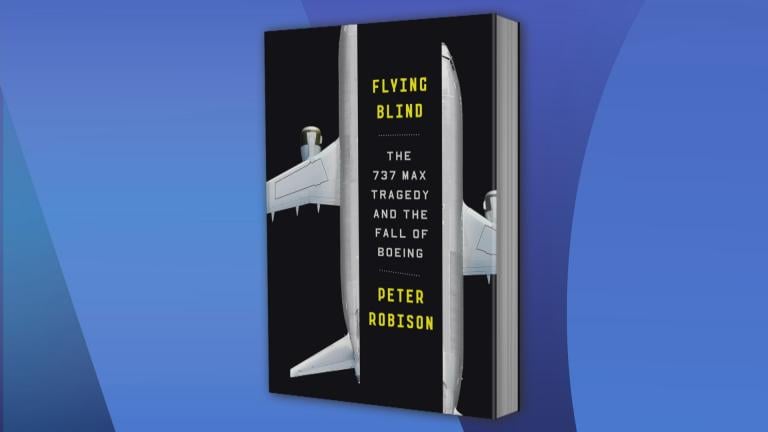At the time of Muhammad Ali’s death last year at the age of 74, he had become one of the most respected, beloved and best-known athletes of all time.
But when he was at the top of his game some 50 years ago, he was widely reviled for his political activism. As with many of Ali’s bouts, he ultimately prevailed and in no small measure helped change America. There’s more to Ali, both positive and negative, than many people know and quite a bit of it is uncovered for the first time in a new biography released this week.
It’s called simply “Ali: A Life” by former Wall Street Journal reporter and longtime Chicagoan Jonathan Eig.
Eig joins host Eddie Arruza in discussion. You can also listen to a 1975 interview with Ali at the Studs Terkel Radio Archive.
Below, an excerpt from the book.
![]()
PREFACE
Miami, 1964
ROUND 1. THE CHALLENGER: CASSIUS CLAY
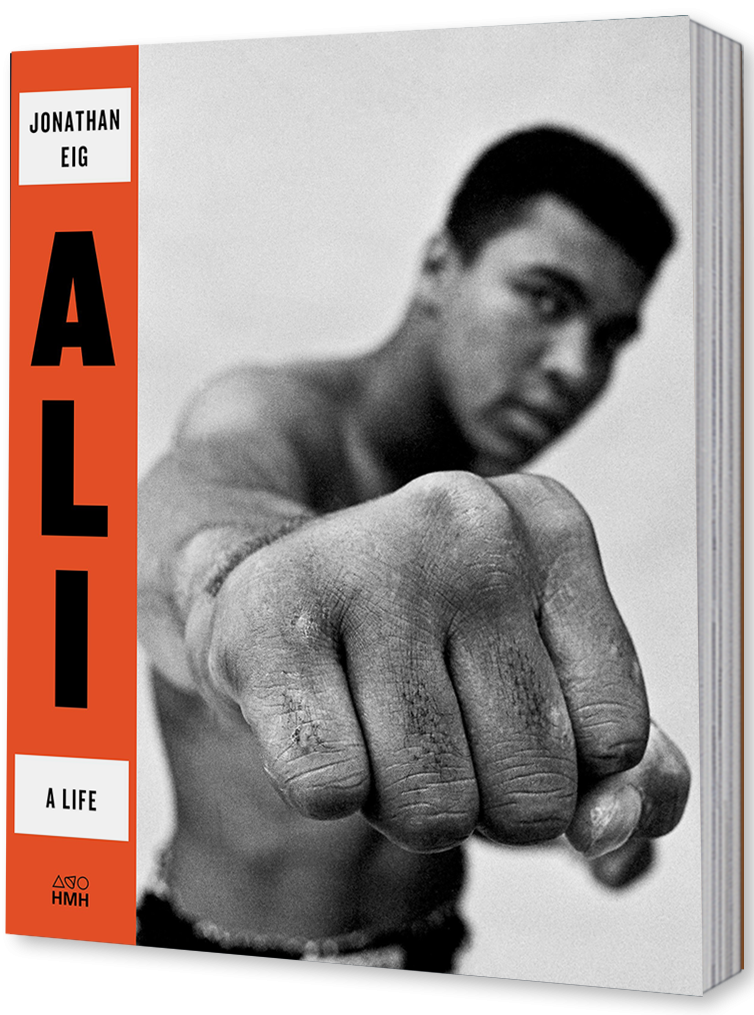 A long, black Cadillac glides past waving palm trees and stops in front of the Surfside Community Center. The afternoon sun flashes off the car’s chrome bumpers. Cassius Clay gets out. He’s dressed in a custom-made denim jacket and swinging a dandyish walking stick.
A long, black Cadillac glides past waving palm trees and stops in front of the Surfside Community Center. The afternoon sun flashes off the car’s chrome bumpers. Cassius Clay gets out. He’s dressed in a custom-made denim jacket and swinging a dandyish walking stick.
He checks to see if anyone has noticed him. Not yet.
He shouts, “I’m the biggest thing in history! I’m the king!”
Clay is tall and stunningly handsome, with an irresistible smile. He’s a force of gravity, quickly pulling people into his orbit. Horns honk. Cars on Collins Avenue stop. Women lean out of hotel windows and shout his name. Men in shorts and girls in tight pants gather around to see the boastful boxer they’ve been hearing so much about.
“Float like a butterfly! Sting like a bee!” he yells. “Rumble, young man, rumble! Ahhhh!”
As the crowd grows, the chief of police arrives and tries to move Clay off the street and into a parking lot where he might cause less trouble. A newspaper photographer points his camera, but instead of smiling Clay opens his mouth wide in a pantomime scream. He throws a left jab that stops inches short of the camera.
“I’m pretty and move as fast as lightning,” he says in his sweet Kentucky accent. “I’m just twenty-two and I’m gonna make a million dollars!”
ROUND 2. THE CHAMPION: SONNY LISTON
Sonny Liston’s left hand is a battering ram, his right a sledgehammer. Bom! Boom! Bom! Boom! He pounds the heavy bag so hard the walls shake and sportswriters’ hands jump as they scribble ornate synonyms for “scary.”
Liston is the most punishing boxer in more than a generation, with fists each measuring fifteen inches around and a chest jutting forth like the front end of an M4 Sherman tank. He is fearless and vicious. How vicious? Once, he started a fight with a cop, beat the cop senseless, snatched his gun, picked him up and dumped him in an alley, and then walked away smiling, wearing the cop’s hat.
Liston does not merely defeat his opponents; he breaks them, shames them, haunts them, leaves them flinching from his punches in their dreams. Sonny Liston is America’s curse. He is the black menace sprung from white racist stereotypes. And he likes it that way.
“There’s got to be good guys, and there’s got to be bad guys,” he says, comparing the world to a cowboy movie. “Bad guys are supposed to lose. I change that. I win.”
When he learns that the young man he will soon fight for boxing’s world heavyweight championship is outside the community center where he trains, Liston steps into the sun to meet the troublemaker. He swats away the outstretched hands of fans and marches until he’s nearly within punching distance of Cassius Clay.
Liston stops and smiles.
“Clay,” he tells a reporter, “is just a little kid who needs a spanking.”
ROUND 3. THE MINISTER: MALCOLM X
In a cramped hotel room near John F. Kennedy Airport in New York, thirty-eight-year-old Malcolm X talks into the night, telling his life story to a reporter. Malcolm is a tall, lean man with a strong jaw and horn-rimmed glasses. Even smiling, he bears a stern expression.
Malcolm paces as he dictates, sitting only to scribble notes on napkins. He can’t wait until old age to produce his autobiography. He’s recently been suspended from the Nation of Islam for disobeying the radical group’s leader, Elijah Muhammad, and doesn’t know if he’ll ever go back. A few months earlier, Elijah Muhammad had ordered his ministers not to comment on the assassination of President Kennedy, out of respect for a nation in mourning, but Malcolm had spoken out anyway, saying the killing was an outgrowth of the violence sown by America in Vietnam, the Congo, and Cuba. “Being an old farm boy myself,” Malcolm had said, “chickens coming home to roost never did make me sad; they’ve always made me glad.” There are other issues, other forces driving a wedge between Malcolm and his teacher. Malcolm has learned that Elijah Muhammad had fathered numerous children with young women employed by the Nation of Islam. Malcolm has been telling others in the organization about their leader’s disappointing behavior. Now, Elijah Muhammad is furious, and rumors have made their way to New York that Muhammad wants Malcolm X dead.
All his life Malcolm has survived. He’s survived poverty, prison, and knife fights. He plans to survive this, too.
This is where his struggle for survival starts: in a hotel room by the airport, working on his autobiography, because words give power. And Malcolm isn’t going to let Elijah Muhammad or J. Edgar Hoover’s Federal Bureau of Investigation or the white news media or anyone else define him with their words. He will define himself with his own words, his own new credo, on his own terms. A great revolution is building in America. The prevailing racial order is under attack with a fury not seen since the Civil War. Black men and women are awakening and fighting for power. Change is coming, finally, and Malcolm is determined to push it — force it, if need be — regardless of what Elijah Muhammad or anyone else has to say.
It’s 2 in the morning when Malcolm leaves the hotel and drives to his home in Queens. An FBI agent monitors his every move. Later the same day, Malcolm, his wife, and three daughters board a plane for the family’s first vacation ever. This, too, is part of Malcolm’s plan. He wants the world to see that he’s not a bomb-throwing lunatic but a father, a husband, a minister of God who believes America can and must reform. He plans to take pictures and jot notes for a newspaper feature story he’s calling “Malcolm X, the Family Man.”
When the plane touches down in Miami, a car waits to carry Malcolm and his family to their blacks- only motel on Miami Beach. According to an FBI informant, the driver is Cassius Clay.
ROUND 4. THE CHALLENGER: CASSIUS CLAY
Clay shouts like he’s possessed by demons: “You ain’t got a chance, ain’t no way you gonna beat me and you know it!”
It’s the morning of the fight, time for the combatants to meet the press, show off their powerful bodies, and step on the scales to check their weights. The room reeks of cigarette smoke, body odor, and cheap cologne. The reporters have never seen a professional athlete behave so unprofessionally. Some say Clay has lost his mind, that fear of Sonny Liston has made him snap.
Everyone in the room is talking, but Clay is talking loudest of all.
“No chance! No chance!” he hollers, ignoring the boxing officials threatening to fine him if he doesn’t shut up. Like Malcolm X, Clay won’t be told what to do. He’ll beat the odds and defy the expectations of any who would seek to control or exploit him.
Clay points at Liston, saying he’s ready to fight the champ now, this very instant, without gloves, without a referee, without a paying audience, man against man. His face shows no trace of humor. He yanks off his white robe, revealing a long, lean, brown physique, his stomach and chest muscles rippled. He lunges at Liston as members of his entourage grab hold and restrain him.
Maybe Clay’s not crazy. Maybe he knows instinctively, or from the experience of growing up with a bullying, violent father, that the worst thing a threatened man can do is show fear.
“I am the GREATEST!” Clay shouts. “I am the CHAMP!”
Excerpted from ALI: A Life by Jonathan Eig. Copyright © 2017 by Jonathan Eig. Used by permission of Houghton Mifflin Harcourt Publishing Company. All rights reserved.
Related stories:
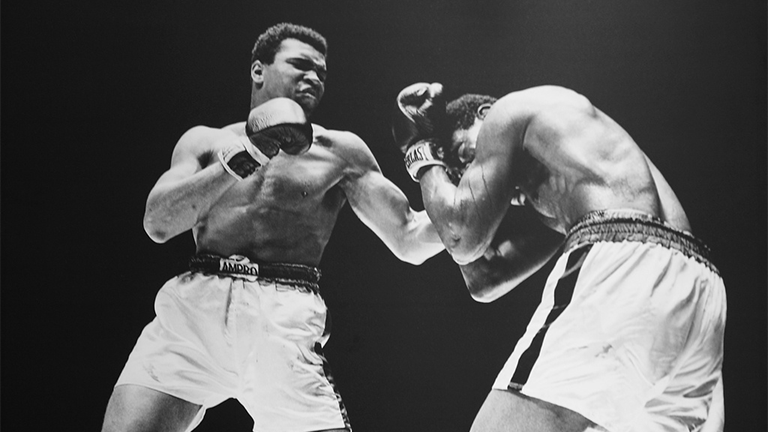 Chicago Journalist Shares His Memories of Muhammad Ali
Chicago Journalist Shares His Memories of Muhammad Ali
June 9, 2016: A Muslim prayer service was held Thursday to honor the boxer in his hometown of Louisville, Kentucky. As part of a Nation of Islam delegation, Salim Muwakkil met Muhammad Ali in Kingston, Jamaica in 1974.
 Jonathan Eig on ‘The Birth of the Pill’
Jonathan Eig on ‘The Birth of the Pill’
Oct. 14, 2014: Chicago journalist Jonathan Eig talks about his new book, “The Birth of the Pill,” and the history of the development of the birth control pill.

